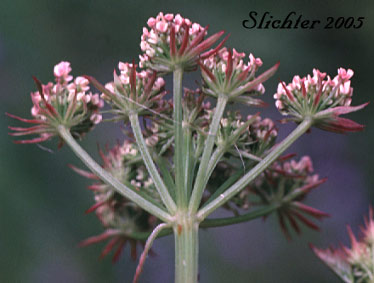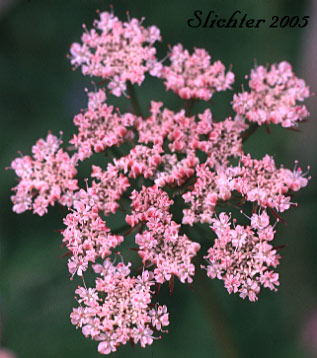

 The
photo at right shows the top of an umbel of water-parsley. The outer surfaces
of each flower may be pink, as shown here, or white. The umbels typically are
flat-topped. Photographed at the Jackson-Frazier Wetlands in Corvallis, OR.......June
22, 2001.
The
photo at right shows the top of an umbel of water-parsley. The outer surfaces
of each flower may be pink, as shown here, or white. The umbels typically are
flat-topped. Photographed at the Jackson-Frazier Wetlands in Corvallis, OR.......June
22, 2001.
Water-parsley is a perennial wildflower with weak, reclining to scrambling-ascending stems arising up to 1.5 meter long from weak, fibrous roots. The herbage of the stems and leaves is generally glabrous. The stems will often root at the nodes when they touch the ground and they are noticeably branched. The leaves are bipinnate to tripinnate with toothed to cleft leaflets from 1.5-6 cm long and 7-50 mm wide. The leaflets have varied margins, ranging from parted to toothed or lobed. The lower leaves, including the petiole, are 20-60 cm long.
The inflorescence is a flat-topped umbel with 8-20 rays from 1.5-4 cm long. The involucre at the base of the umbel has several narrow leafy bracts or may be absent. Several narrow bracts may be found at the base of each umbellet (See photos this page.). The tiny flowers are white, although the outer surface of the petals may be pinkish. The fruits are oblong with squared-off tops and ribs wider than the narrow intervals. The fruit average 2.5-3.5 mm long and 1.5-2 mm wide.
Water-parsley may be found in low most places along streams and marshes or in moist thickets.
Water parsley may be found from the panhandle of Alaska south to the west of the Cascades & Sierra Nevada Mts. to central California. It is found eastward through the Columbia River Gorge to portions of the Blue Mts. of north-central Oregon.